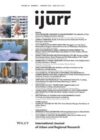Participatory planning is widely used for the purpose of democratizing urban governance. Yet, the literature on post-politics largely depicts participatory decision-making contexts as spaces devoid of the ‘properly political’. Scholars critical of post-politics find this lens paralyzing, as the approach may disregard political moments arising within participatory settings. The lens is useful for diagnosing a decision-making context as post-political on a broader level, but there is a tendency to paper over the significance of the micropolitical landscape operating inside institutional participatory decision-making settings. Revealing this landscape, as is done here for a case of urban renewal in Copenhagen, can help us move beyond the analytical straitjacket of post-politics and defy a simplified image of it. Taking localized political acts seriously, I analyze the actors and practices that emerged during participatory processes used to create two new public parks during a large-scale urban renewal project in the Nørrebro neighborhood in Copenhagen, Denmark from 2001 to 2012. The findings include: conceptually, a dialectical relationship between post-politics and re-politicization; empirically, the construction of a post-political police order, the mechanics of (de)politization, and how opposition interacts with these factors; and, more generally, how voices are reclaimed from noise and the significance of these political moments.
Details
Written by:
Stephanie Loveless
Digital Object Identifier (DOI)
https://doi.org/10.1111/1468-2427.70005
About DOI
